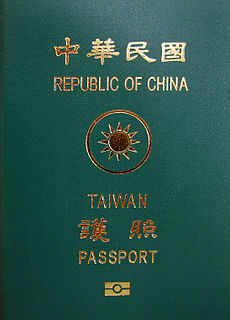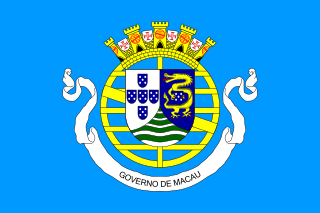
Chiang Wei-kuo was a Chinese Army general, and an important figure in the Kuomintang. He is an adopted son of Republic of China President Chiang Kai-shek, adoptive brother of President Chiang Ching-kuo. His courtesy names were Jian'gao (建鎬) and Niantang (念堂).

The Republic of China passport is the passport issued to nationals of the Republic of China (ROC), commonly known as Taiwan. The passport is also commonly referred to as a Taiwan Passport or a Taiwanese passport.

Wai Pang Kwan, known professionally as Teddy Robin, is a Hong Kong English pop singer-songwriter, actor, and director and producer. He began his music career in mid 1960s when Hong Kong English pop was at its peak. He formed a rock and roll band with his friends called Teddy Robin and the Playboys while Teddy was the vocal and guitarist. The band was the first Chinese-led rock band in Hong Kong. The band became a massive hit in Hong Kong.

Republic of China on Taiwan is a political term as well as discourse regarding the present status of the Republic of China. It is proposed by former president of the Republic of China Lee Teng-hui, the first Native Taiwanese President. During his presidential tenure in 1995, Lee visited his alma mater Cornell University and mentioned this term for the first time when delivering an Olin Lecture.

The Seediq are a Taiwanese indigenous people who live primarily in Nantou County and Hualien County. Their language is also known as Seediq.

Jack C.K. Teng, was a Chinese educator, writer, politician, diplomat and Olympic pioneer. Jiangsu Jiangyin County, a former National Yingshih University President, China National Amateur Athletic Federation and Chinese National Olympic Committee Chairman, the Ministry of Education Viceminister, the central (design) assessment, chairman of the Disciplinary Committee, the Ministry of Civil Ministers. He's best known as the Chairman of the Chinese National Olympic Committee during the huge win honor for China, the 17th World Games in Rome, the first time on Chinese athletes to win an Olympic medal.

Suisheng Zhao is a professor of Chinese politics and foreign policy at the University of Denver's Josef Korbel School of International Studies. He serves as director of the school's Center for China–US Cooperation, and is the founding editor and the editor-in-chief of the multidisciplinary Journal of Contemporary China.

Xinyi Special District, also known as Xinyi Planned Area, is located in Xinyi District, Taipei, Taiwan. The total area of Xinyi Special District is 153 hectares. It was designed in the 1970s and developed from the 1980s onward. Xinyi Special District is the prime central business district of Taipei. Important infrastructure, such as Taipei 101, Taipei City Hall, Taipei International Convention Center and Taipei World Trade Center, is located within this area.

In Taiwan, the North–South divide refers to the uneven distribution of resources in regard to political, wealth, medical, economic development, education and other aspects across the country over past decades that has drawn the social and cultural differences between northern and southern today. The core spiritual tenet is derived from Southern Taiwanese's long-standing mindset, as they believe they had been treated and regarded as socially inferior by the Taiwanese central government. The anger from the south quickly echoed throughout central Taiwan and eastern Taiwan, as they also thought they're not fairly treated by the central government, compared to the northern part of Taiwan. It was known from history that the Taiwanese central government's policy support for local industrial development as well as public infrastructure is the critical determinant of a local city's future prospects for the resident population.

Kolas Yotaka, formerly Yeh Guan-lin is an Amis Taiwanese politician and journalist.
Hong Kong-Mainland China relations refer to the relationship between Mainland China and Hong Kong. According to the 1997 Sino-British Joint Declaration, the United Kingdom handed control of Hong Kong over to the People's Republic of China, making it a special administrative region. In principle, Hong Kong became an autonomous administrative division based on the Hong Kong Basic Law.

Si̍t-chûn Movement, inasmuch as the Kyoto School, Neo-Confucianism and other prominent philosophical movements in the early-twentieth-century East Asia, is a significant philosophical movement during the Japanese colonial rule in Taiwan, in which the intellectuals in the 1920s formulated their reflections on the Taiwanese community through the western values and thoughts and wedged against the colonial domination and imperial assimilation. Si̍t-chûn Movement was intensely bond with political and cultural counter-imperialism, involving intellectuals e.g. Lin Mosei(zh:林茂生), Hung Yao-hsün(zh:洪耀勳), Wen Kwei Liao(zh:廖文奎), Mingdian Liu(zh:劉明電), Shao-Hsing Chen(zh:陳紹馨), Lin Qiu-wu(zh:林秋悟), Hsiang-yu Su(zh:蘇薌雨), Shenqie Zhang(zh:張深切), Chin-sui Hwang(zh:黃金穗), Shoki Coe(zh:黃彰輝), Isshū Yō(zh:楊杏庭), C K Wu(吳 振坤), and so forth. ‘At the begin,’ according to the Taiwanese cultural sociologist Ren-yi Liao ’s 1988 grounding formulation, ‘Taiwanese Philosophy has been a civil intellectual movement against domination, rather than an academic form of conception.’ ‘Si̍t-chûn Movement’, however, has yet ratified and systemically studied until 2014.

Philosophy in Taiwan(Chinese: 台灣哲學) is the set of philosophical and thought movements in Taiwan, while Taiwanese Philosophy approaches Taiwan as a subject of philosophical significance. For instance, the postwar concurrence with Neo-Confucianism canonized the Chinese Philosophy in Taiwan, contra the Cultural Revolution in the People's Republic of China, may somehow omit the complexity of Taiwanese Philosophy. With the unearthing literature and sprouting discourses due to the merits of democratization, public debates on whether historical configuration of Taiwanese Philosophy or many faces of Taiwanese philosophers, have unveiled the world intellectualism of Taiwanese Philosophy via Japan in the Golden 1920s and later substituted with the postwar Chinese Confucian Canons. Nevertheless, a reinvigorated formulation on Taiwanese Philosophy that China and Japan at different times imprint as exogenesis; and thus, a burgeoning philosophical development with the Taiwanese Gemeinschaft

Liang Island is an island located in the East China Sea in Beigan Township, Lienchiang County, Fujian Province, Republic of China (Taiwan). The island is closed to the public. The island is located 26 kilometers (16 mi) from both Beigan Island and Dongyin Island and 19.25 kilometers (11.96 mi) from Kuishan Island in Haidao Township, Xiapu County, Ningde, Fujian, China (PRC).
Chang and Lee(Chinese: 張三李四) is a Taiwanese band formed in 2010. Their style is generally rock and folk, but they combine elements from other genres such as hip hop, country, electronics, and jazz.
Hou Chi-jan is a Taiwanese director and writer. His works are often related to historical memories.

Macau Independence is the proposition that supports independence of Macau from the People's Republic of China. Despite receiving little attention within Macau, the issue was raised in the Legislative Council following the Hong Kong Legislative Council oath-taking controversy. In 2017, several Chinese media outlets warned against discussion of Macau independence, fearing that speculation would lead to further action.

The Fujian-Taiwan relationship, also known as the Minnan-Taiwan relationship, refers to the relationship between Fujian, which is located in mainland China, and Taiwan, which is across the Taiwan Strait. Since the average width of the Taiwan Strait is 180 kilometers, Fujian and Taiwan are adjacent, similar in both climate and environment. Although the relationship between Taiwan and Fujian has changed with the development of history, the two places have maintained close relations in terms of personnel, economy, military, culture and other aspects. At present, Taiwan residents are mostly descendants of immigrants from mainland China, of which the southern Fujian ethnic group is the main group, accounting for 73.5% of Taiwan's total population. In terms of culture, language, religion, and customs, Fujian and Taiwan also share similarities.

The motherland controversy happened in 1936 in colonial Taiwan of Japan. Lin Hsien-tang, the chief of the family of Lin from Wufeng, Taiwan, was openly humiliated by a Japanese gangster in 1936 for he had once called China his motherland. The media propaganda afterwards forced Lin to quit all political positions and moved from Taiwan to Tokyo in order to avoid further controversy. This controversy is believed to be deliberately raised by Japanese military, who tried to warn Taiwanese intellectuals about their Chinese nationalism.















